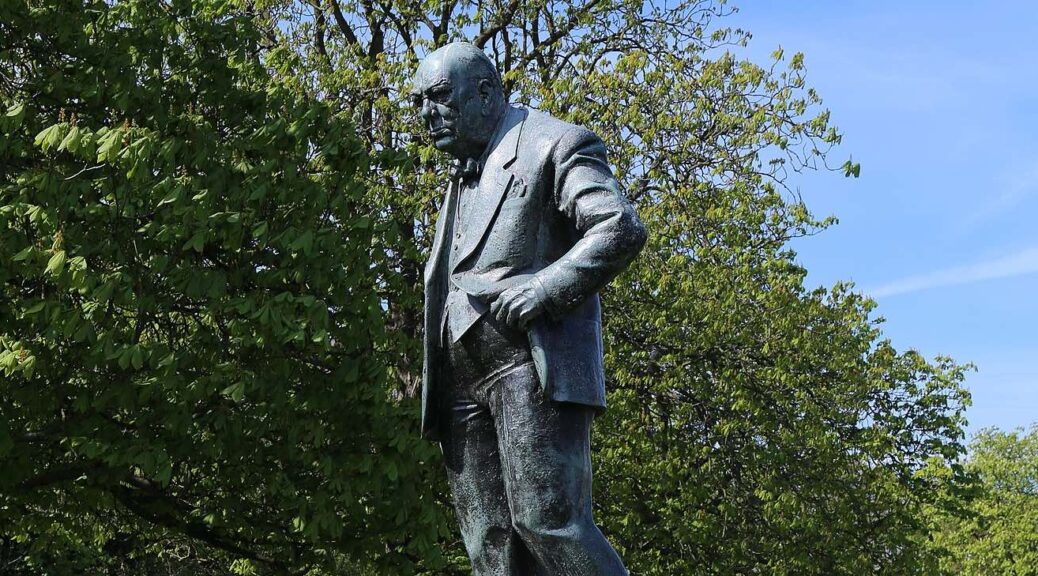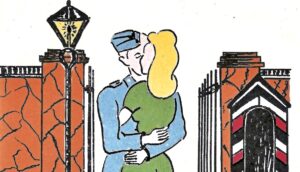
Churchill Anecdotes: Epping, Woodford, “Lili Marlene,” Fitzroy Maclean
Underneath the lantern, By the barrack gate
Darling I remember, The way you used to wait.
‘Twas there that you whispered tenderly, That you loved me, You’d always be
My Lili of the lamplight, My own Lili Marlene.
Epping and Woodford
Churchill represented the Essex constituencies of Epping and Woodford forty years, from 1924 to 1964. (In 1945 they were subdivided and he stood for Woodford.) Through his retirement in 1964, that was more than half his adult life. In about a year, we mark the centenary of his first election there. Richard Cohen, who lives in Loughton, is developing a suitable celebration—of which more anon.
Mr. Cohen kindly sends me a lecture by Allen Packwood, around the 90th anniversary of Churchill’s election. Many who labor in the Churchill vineyard know Mr. Packwood as head of the Churchill Archives Centre, Cambridge. Collectively we are all in his debt for vast assistance in researches large and small. Speaking in 2015, Allen explained how much the Essex seat had meant to WSC:
Churchill was never really a party politician. He always strove to be a national figure. He may not have been highly involved in local affairs, preferring to leave such matters to his efficient local team…. But he did bring national issues to Epping and Woodford. If anything, even more to Woodford after the war, for when he came here it was as one of the most famous men of his age…
Woodford handily elected Churchill in 1945, but in the General Election his Conservative Party was thrown out. Only temporarily sidetracked, he came back as a scintillating Leader of the Opposition. Recalling his postwar appearances in Essex, Mr. Packwood reminded me of the wartime song Lili Marlene, and an anecdote by Sir Fitzroy Maclean.

Lili Marlene
Written 1915 by Hans Leip (1893–1983), but not well known until 1941, Lili Marlene was first recorded in 1939 by Lale Andersen, a Swedish singer popular in Berlin cabarets. Two years later it was broadcast as a filler between news programs by the troop station Deutsche Soldatensender in occupied Belgrade. It was an instant sensation among German troops from Norway to Africa. But that was just the beginning.
In 1942, soldiers of the British 8th Army in North Africa heard Lili on the German wireless. A 1944 BBC video takes up the story, related by Denis Johnston:
On 4 July 1942 the 8th Army held the line at El Alamein. There weren’t many radios up forward near the battle area, except probably the one in our recording truck. We used to turn on the news every night and listen to it…. Chaps would come in from all over the desert, like birds coming in around a lighthouse. They’d sit and listen. You’d see the glow from their cigarettes and pipes, and the little glow from the radio dial. After the news was over, we’d switch over to the “Messages Home” programme from Germany. And before long it would go Ompa, Ompa—and there was Marlene…. The 8th Army swept on, capturing on its way 800 miles of desert, 75,000 prisoners, 5000 tanks, 1000 guns, and the famous enemy song of Lili Marlene.
The captured tune
Suddenly a German war ballad became the 8th Army battle song, copyright El Alamein, 1942. The BBC wrote its own lyrics, sung by Jewish refugee Lucy Mannheim and beamed right at Berlin….
Your men is dead I hear it. It graves the Russian snow,
Yes die you must I fear it, For Hitler wills it so.
Oh could we only meet once more, Our country free of shame and war,
And stand beneath the lantern. We two— Lili Marlene
Führer I thank and greet you, For you are good and wise
Widows and orphans meet you, With hollow silent eyes,
Hitler, the man of blood and fear, Hang him up on the lantern here
Hang him up from the lantern! Oh Führer —Lili Marlene
German propaganda minister Josef Goebbels was incensed. After a lame attempt at a more martial version, he banned Lili Marlene from the radio, ordering Lale Andersen never to sing it again. It didn’t matter. German troops continued to sing it, listening surreptitiously to BBC broadcasts. (Dame Vera Lynn recorded a less grim version.)
“Pleasing to the ear…”
Churchill returned to speak in Essex in October 1946. Allen Packwood related an appearance unrecorded in the Complete Speeches. This was at a private dinner at the King’s Head Public House in Chigwell. (On the menu was trifle “garnished with the outline of a cigar.”) Mr. Packwood found this account in a local newspaper:
Whilst he was having his dinner, the patrons in the bar below regaled him with many of the songs which became famous during the war years, including “Roll Out the Barrel,” “Hanging Out the Washing on the Siegfried Line,” and last but not least “Lili Marlene.” The former German army song was apparently the most pleasing to the ear of Mr. Churchill, for he was heard to observe that its “capture from the enemy was one of the most satisfactory features of our victory in North Africa.”
Before he left, Churchill asked them to sing it one more time, and tapped along heartily with his cane. “It is a wonderful image,” Mr. Packwood commented. Indeed so. Lili Marlene was the war prize of His Majesty’s 8th Army.
For some reason, the story reminds me of another great leader and enemy song—years before. After victory in the American Civil War, to general surprise and some grumbling, President Lincoln ordered that Washington bands play Dixie. He said, “I always thought it was a dandy tune.” And, like Lili Marlene, Dixie too had a separate set of lyrics on the Union side.
Fitzroy Maclean remembers Lili
Video
“The True Story of Lili Marlene,” BBC, 1944






